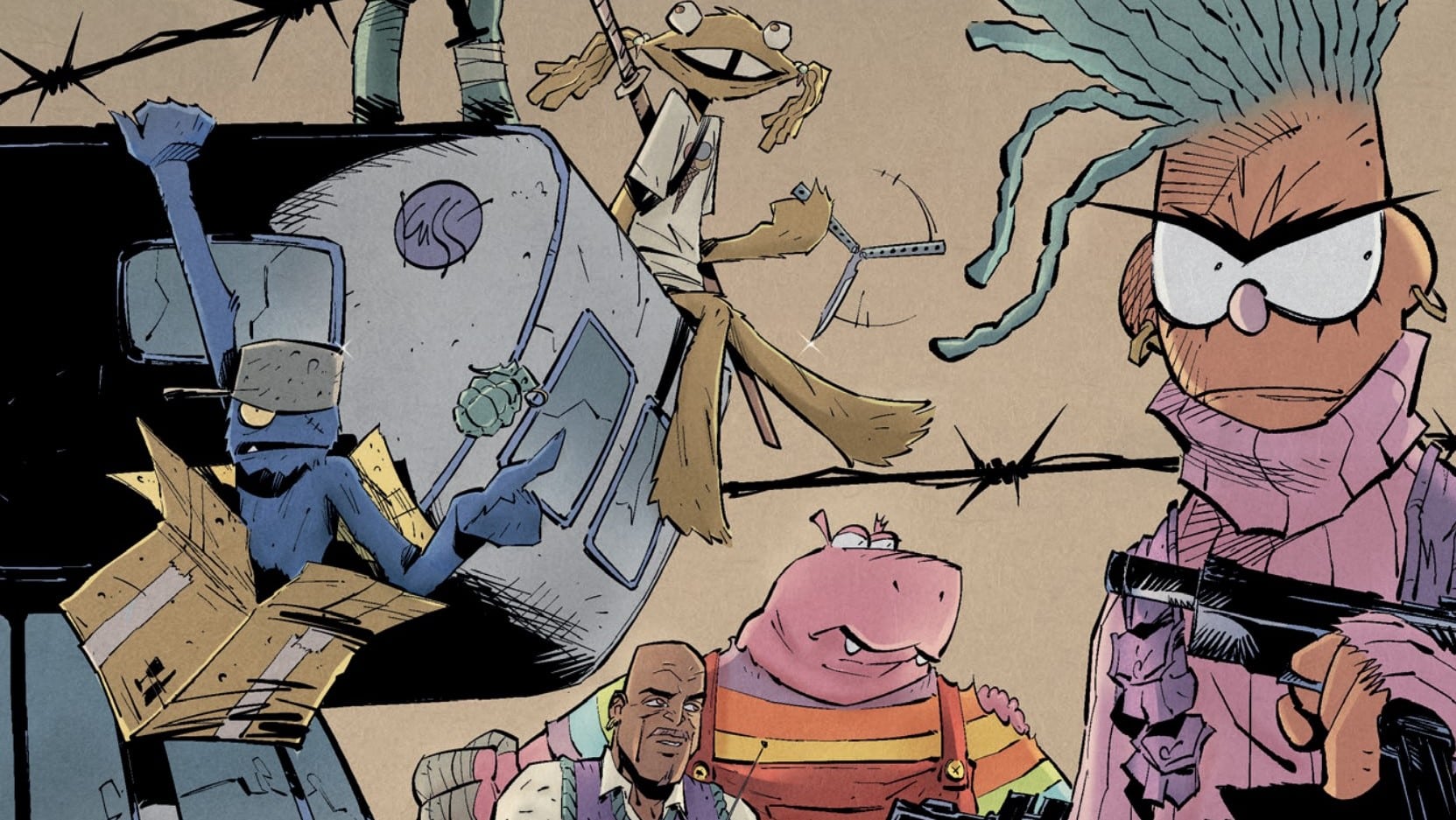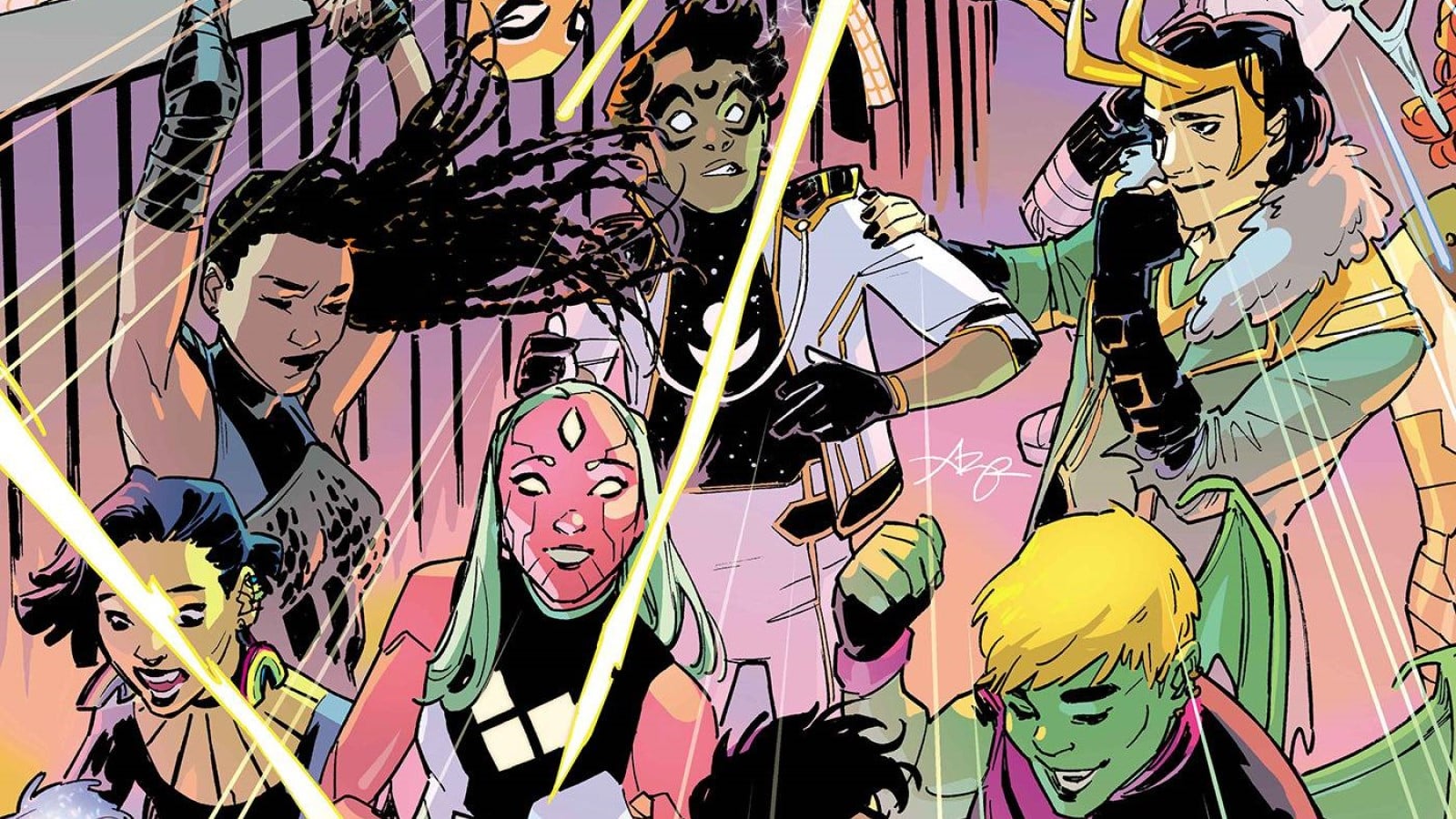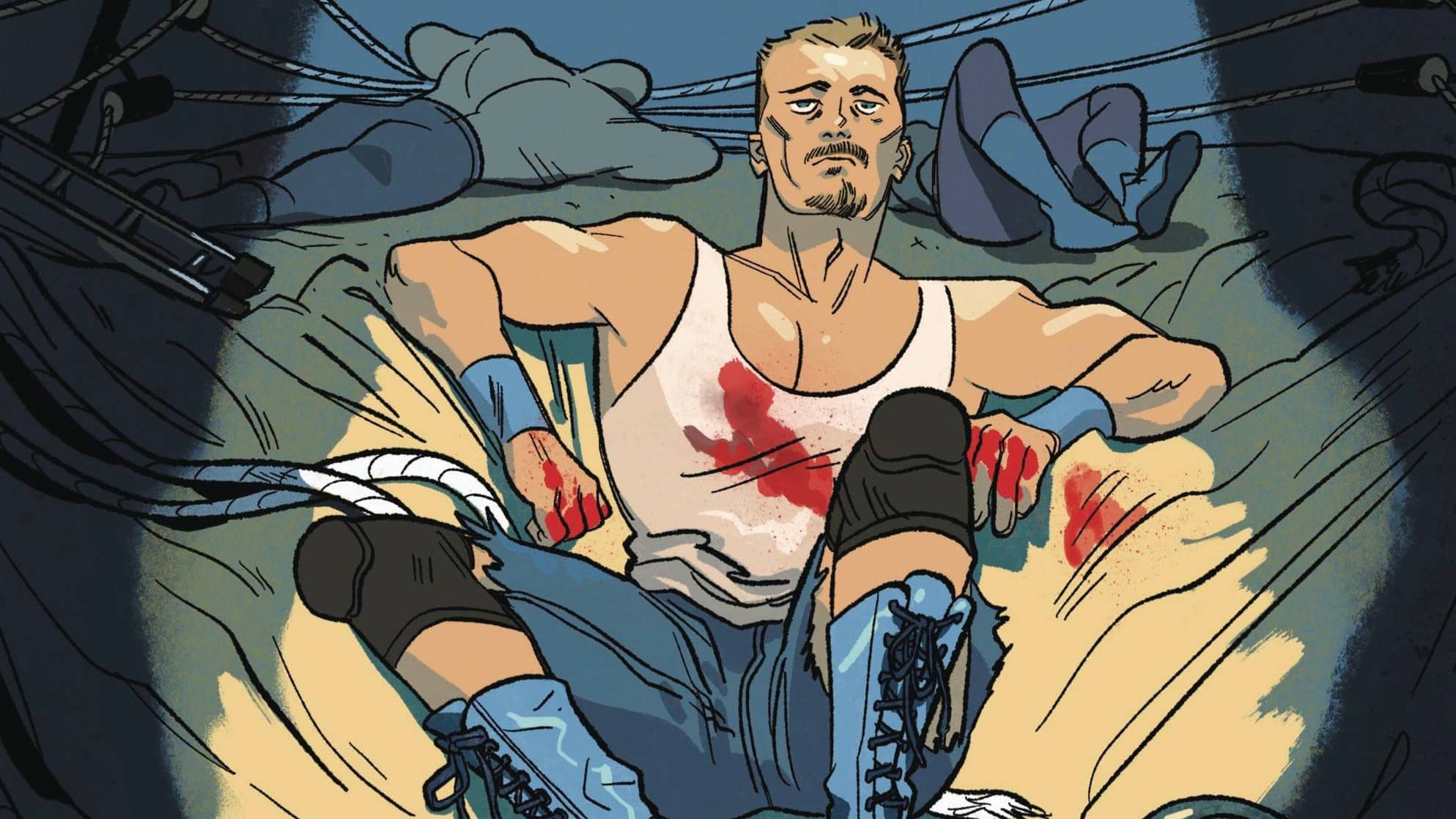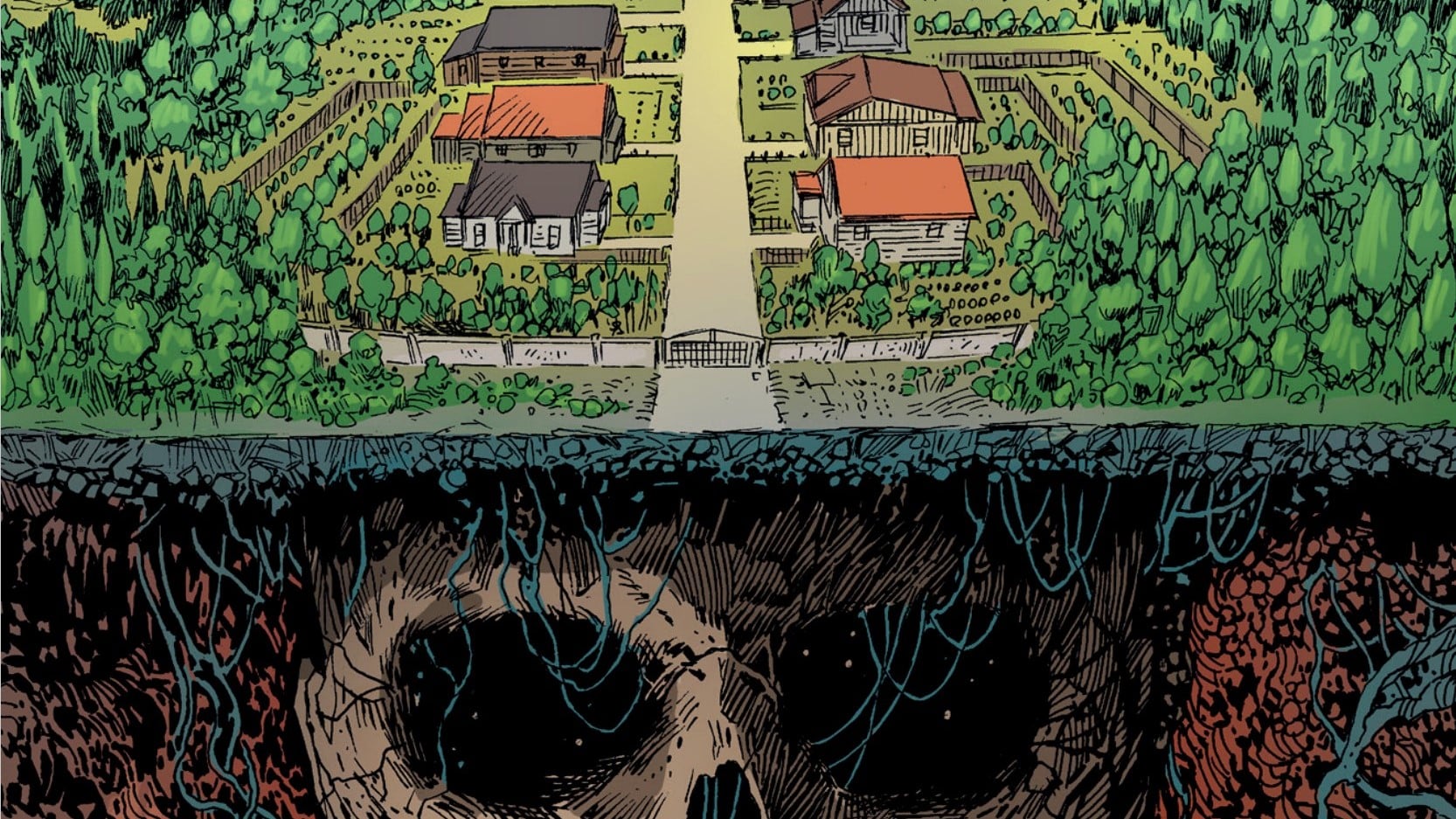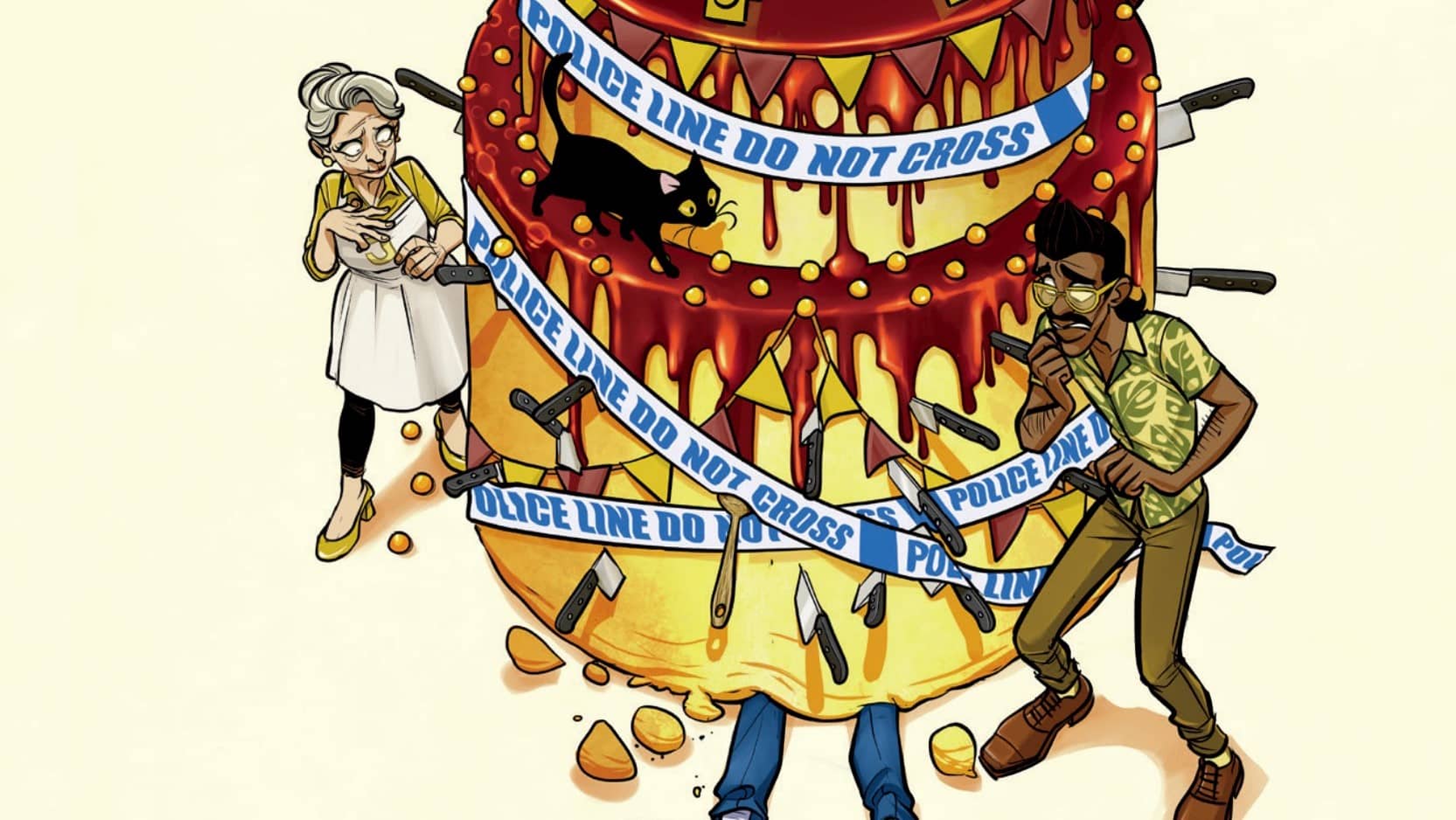A mostly empty story ends with … well, you can guess. The Closet #3 is written by James Tynion IV, drawn by Gavin Fullerton, colored by Chris O’Halloran, lettered by Tom Napolitano and published by Image.
To the future where there is no magic. To the past when magic was young. And to the present, when stuff is normal. There’s quite the ride in Starhenge: Book One, written, illustrated and lettered by Liam Sharp with additional art by Matylda McCormack-Sharp and published by Image.
These puppets? Yeah, they’re tired of your shit in Survival Street #1, written by James Asmus and Jim Festante, drawn by Abylay Kussainov, colored by Ellie Wright, lettered by Taylor Esposito and published by Dark Horse.
Will Nevin: A great man once said, “Space is disease and danger wrapped in darkness and silence.” And with space comes uncertainty. Anxiety, even. But do you know what’s a great cure for that? Predictability! We’ve got it all this week, Ian.
Ian Gregory: Will, that made even less sense than usual. I’m getting concerned. Are you … good? You need anything? A glass of water?
Will: OPENING BITS ARE HARD, OK?!
The Closet #3: Into the Pit of Nothingness With Ye

Will: Let’s start with the predictability. We took up The Closet #1/#2 together, and I’m glad we did — there simply wasn’t much to talk about there individually. And there might be even less here. Thom is still not a great dad or partner, and he’s still complaining to people who — like us, the readers — can see directly through his transparent shit. He and his son complete their cross-country trip to find … that nothing will change. Thom and his wife still argue. The child is still plagued by the monster even though the closet is new. This is a flat finish on a whole book of nothing.
Ian: I think last time we covered The Closet I said I was glad that it was only three issues, because there wasn’t much going on. All of a sudden, I’m mad that it’s only three issues because this is just a massive nothing-burger of an ending. I love to read a story in which no one learns anything and nothing happens. I’m blaming George Saunders for this one.
Will: I’m still trying to figure out the point of this book. Thom is not a terrible person. Yes, he’s whiny; yes, he’s not going to win Greatest Dad Ever. He cheated on his wife. But that doesn’t make him evil. He doesn’t hit his son or berate him. I dunno, I feel like this minimizes actual child abuse in some way.
Ian: Maybe there have just been too many dad comics. I don’t see what this offers to the Sad Dad Cinematic Universe. This feels like a fifth of a premise — dad is sad, dad is bad at dad, child is sad, the end. The monster is, ultimately, nothing more than a cute visual metaphor. Thom is completely static, his wife is completely static, and his kid is barely even a character. Give us something to work with here.
Will: Finally, what did you think about the inclusion of a Black man to listen to Thom’s expository bullshit? For me, it got a bit too close to some uncomfortable tropes.
Ian: I had two thoughts about this scene: one, who in the world talks to random people at motels. Come on. Second, I did kind of like that Thom is so selfish he drives away what is essentially a plot device for character development. So yeah, while it does approach that tired trope, Thom’s overwhelming self-absorption manages to abort things at the last minute.
Will: That man? So far up his ass.
Starhenge Book 1: Pretty, Pretty Pictures

Will: I don’t know if you’re itching for this, but unlike NewThink, this is not a book you can blame on me since this is a dictatorial edict on high from Boss Man Zack and Editor Dan [Grote’s note: I said what now?]. Of all the things this is, it is certainly … a comic. And that’s really all I’m prepared to say about it. It’s Liam Sharp as writer and artist, so it certainly looks beautiful. At least in terms of style and ambition, it reminded me of Grant Morrison’s Arkham Asylum: A Serious House on Serious Earth. It’s weird. It’s out there. I know some people will dig the shit out of it.
Ian: There’s a lot happening in this first issue. You’re right that it’s totally gorgeous, and looks like nothing except itself. Each of these three stories feels like it’s got completely disparate influences — the Arthuriana stuff, the Warhammer 40k-style future, and the high school sweethearts of the present. It’s hard to see how that all will come together, and if it will even make sense when it does. This definitely held my attention for the entire issue, but I’m not sure exactly what I think of it.
Will: What did you like (or not like) about these three parallel narratives — the present, the techno future and the magical past — and how they came together? I thought the future bits were some of the most stunning to look at but were also saddled with the clunkiest technobabble.
Ian: There’s certainly a lot of exposition, even in the present narrative as Amber relates various mythologies or histories to the reader. At times, this feels less like a comic and more like a series of captioned paintings — well, I guess that’s just what a comic is. When things do get more standard, Sharpe limits himself to the ole’ grid format, and I think that’s a bummer. These layouts don’t actually hold up to the innovation of the art.
Will: Here’s a game we can play in this book: What do you think was the coolest fucking panel?
Ian: I’m definitely a fan of the page where we see The Cast’s machine spaceship. The vision on these science fiction pages is really great.
Will: I’ll go with both The Cast’s torture machine and their robots. Weird, unsettling stuff. But great!
Survival Street #1: Yes, and Your Point?

Will: Not to give away too much of how the sausage is made, but since I know Fridge Raiders are crazy to read about all of that stuff, our general practice — as we’ve discussed — is that I work up our dialogue and generally pick the books we’re going to read. (With your input, naturally.) However, I feel like I’m really leaning into my personal preferences for satire, horror, comedy and crime. I promise, I’ll try to be better and choose stuff out of my lane.*
*does not apply to next week, when we’ll be covering Phillip Kennedy Johnson’s new James Bond book
Anyway, Ian, here’s another satire. It wasn’t my favorite, and I think anything effective here was done better in Justice Warriors.
Ian: I did enjoy Justice Warriors, but satire is such a messy genre that I feel like its hit rate has to be low — lower than 20%. Stuff that other people really enjoyed, like Not All Robots, just passed me by. I think part of that is that the least interesting thing about satire is when it’s saying something you already agree with — when they’re preaching to the choir. No one is being served by that, and instead I just feel like the author is going for easy laughs because they know the audience is on their side.
Will: Part of the problem, I think, is that this premise is too busy. First, we have an America that’s been 100% corporatized. That’s fine. Whatever. You can do stuff with that. (Like Justice Warriors did.) But you also have puppets that can talk, who live and interact with the human world as we know it. The book is weirdly neither fish nor puppet foul — both too close to reality and too distant from it at the same time.
Ian: I think I’m done with the “Henson puppets but dark” gimmick. Avenue Q came out in 2003. The Happytime Murders came out in 2018. I guess at this point it’s evolving into its own subgenre, but the premise doesn’t really do anything for me anymore. This is, like Justice Warriors, part of the shotgun method of satire, where you just try to cram as many possible riffs and quotes and whatever into your story, but unlike Justice Warriors it feels less exploratory and more referential. It keeps pulling back from the really drastic satire elements to try and do character moments, which means that the story is constantly getting tugged in two directions.
Will: Whatever it is, it’s not without laughs. I thought Corporal Fairness/Punishment as a Grover stand-in was funny. As was the Oscar character who preaches recycling.
Ian: Hey — are the puppets supposed to be Jews? There’s that line about how “puppets ran the media” and stuff, so is the whole angle on this setting that puppetism or whatever is just antisemitism? I really hope that ends up just being a throwaway line, because I’m not sure I can see drawing that analogy out ending well.
Will: Yeah … that was a weird place to go. Let’s hope they don’t go there again.
Does This Smell OK?
- Rapid fire questions:
- Greatest dad ever?
- Will: If I can’t go with mine, I’ll say Patrick Stewart. He just seems like the greatest guy.
- Ian: You may not be able to say yours, but I’ll pick my dad, who is likely currently reading this column.
- Will: Reading this column automatically makes you the greatest dad ever.
- What’s a book you’d bully Zack and Dan into reading?
- Will: Anything published by keenspot. The ComicXF fat cats have been too comfortable for too long — time for them to get woke and read Biden’s Titans or some other dreck.
- Ian: I’d make them read first-wave webcomics. I think Megatokyo could do some real psychic damage.
- Weirdest consequence of puppets being real?
- Will: Puppet fur in … intimate places.
- Ian: All the architecture having to account for the height difference.
- Greatest dad ever?
- I cannot imagine such a thing as leftover steak, but some can, apparently.
- If “drink it” isn’t satisfying enough, here are some tips for leftover wine.
- I don’t want to live on a planet where this headline can be understood.
- Pickle juice, frozen or otherwise, is gross.

